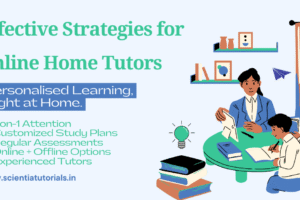Navigating Student Anxiety: Essential Strategies for Home Tutors
Introduction
In today’s fast-paced educational landscape, student anxiety is a growing concern that can significantly impact learning outcomes. Home tutors often find themselves on the front lines, helping students who struggle with stress and anxiety related to their studies. Understanding how to effectively deal with student anxiety is essential for creating a positive learning environment and fostering academic success. This article will explore teaching tips and strategies that home tutors can use to support anxious learners and help them thrive.
Understanding Student Anxiety
What Is Student Anxiety?
Student anxiety refers to the feelings of worry, fear, or unease that students may experience in relation to their academic performance or school environment. This anxiety can manifest in various forms, including:
- Test Anxiety: Fear of performing poorly on exams or assessments.
- Social Anxiety: Discomfort in social situations, including interactions with peers and teachers.
- Generalized Anxiety: Persistent worry that may not be linked to specific academic tasks but affects overall well-being.
Causes of Student Anxiety
Several factors contribute to student anxiety, including:
- Academic Pressure: The expectation to achieve high grades can create overwhelming stress.
- Parental Expectations: Pressure from parents to excel can lead to feelings of inadequacy.
- Fear of Failure: A strong desire to succeed can backfire, resulting in heightened anxiety when faced with challenges.
- Bullying or Social Issues: Negative experiences with peers can exacerbate feelings of anxiety.
Understanding these causes is crucial for home tutors to address the root of the anxiety and tailor their approach to meet each student’s unique needs.
Strategies for Home Tutors to Address Student Anxiety
1. Establish a Trusting Relationship
Building a strong rapport with students is essential for creating a safe and supportive learning environment. Here are ways to foster trust:
- Open Communication: Encourage students to express their feelings and concerns. Let them know it’s okay to share their anxieties.
- Active Listening: Show genuine interest in what your students say. Acknowledge their feelings and provide reassurance.
2. Create a Comfortable Learning Environment
The physical setting of tutoring sessions can greatly influence a student’s comfort level. Consider the following:
- Minimize Distractions: Choose a quiet, clutter-free space for tutoring sessions to help students focus.
- Comfortable Seating: Ensure that the learning space is comfortable, as physical discomfort can contribute to anxiety.
3. Set Realistic Goals
Setting achievable goals can help students feel a sense of accomplishment and reduce anxiety. Here’s how to approach this:
- Break Tasks into Smaller Steps: Instead of overwhelming students with large assignments, divide them into manageable tasks.
- Celebrate Progress: Acknowledge and celebrate even the smallest achievements. This boosts students’ confidence and motivation.
4. Incorporate Relaxation Techniques
Teaching students relaxation techniques can empower them to manage their anxiety. Some effective strategies include:
- Deep Breathing Exercises: Teach students to take slow, deep breaths to calm their nerves before assessments or challenging tasks.
- Mindfulness Practices: Introduce mindfulness exercises, such as guided imagery or meditation, to help students focus and reduce anxiety.
5. Provide Structure and Routine
A structured learning plan can help students feel more secure and in control. Consider the following:
- Consistent Scheduling: Maintain a regular tutoring schedule to provide predictability and stability.
- Clear Expectations: Outline what each session will entail, including goals and activities, to help students mentally prepare.
6. Use Positive Reinforcement
Positive reinforcement encourages students to engage in desired behaviors. Here are ways to implement this technique:
- Praise Efforts: Acknowledge hard work and effort, rather than solely focusing on outcomes.
- Reward Systems: Establish a reward system for achieving goals, which can motivate students and reduce anxiety.
7. Modify Teaching Techniques
Different students have different learning styles. Adapting teaching techniques can help alleviate anxiety:
- Visual Aids: Use diagrams, charts, and other visual resources to make concepts more accessible.
- Interactive Learning: Incorporate hands-on activities that allow students to engage with the material in a fun and stress-free manner.
8. Address Test Anxiety Specifically
Many students face anxiety around tests and assessments. Here are tips for managing test anxiety:
- Practice Testing: Conduct mock tests in a low-pressure setting to familiarize students with the testing process.
- Test-Taking Strategies: Teach students effective strategies, such as time management and question prioritization, to build their confidence.
9. Encourage a Growth Mindset
Fostering a growth mindset can help students view challenges as opportunities for growth rather than threats. Encourage them to:
- Embrace Mistakes: Teach students that mistakes are a natural part of learning and can lead to improvement.
- Focus on Effort: Emphasize the importance of effort and perseverance, rather than just outcomes.
10. Communicate with Parents
Keeping open lines of communication with parents can provide additional support for students. Here’s how to involve parents:
- Share Progress: Regularly update parents on their child’s progress and any observed anxiety-related behaviors.
- Provide Resources: Offer parents resources and strategies they can use at home to support their child’s learning and emotional well-being.
Conclusion
Dealing with student anxiety is a crucial aspect of effective home tutoring. By establishing trust, creating a supportive environment, and employing various strategies tailored to each student’s needs, home tutors can significantly reduce anxiety and foster a positive learning experience. Ultimately, the goal is to empower students to navigate their academic challenges with confidence and resilience. With patience and understanding, home tutors can play a pivotal role in helping students overcome their anxiety and achieve their academic potential.
Final Thoughts
As a home tutor, your influence extends beyond academic instruction. By being attuned to your students’ emotional needs and implementing effective strategies to combat anxiety, you can help them develop essential life skills, build resilience, and achieve their goals. Remember, creating a supportive and encouraging learning environment is key to unlocking each student’s potential.



